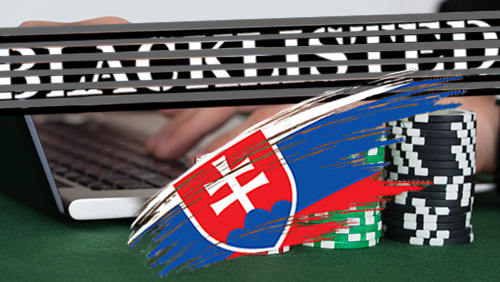Six more operators have been added to Slovakia’s blacklist of online gambling domains, which the authorities said has been serving local punters without government approval.
 In mid-July, the Slovak Financial Administration came out with a list of 10 naughty online gambling operators, including familiar faces like 888 Holdings, Bet365, Bet-at-Home, Bwin, William Hill and 1xbet, along with Curacao-licensed Eatsleepbet.com as well as Malta-licensed LVbet.com and Kajot-casino.com.
In mid-July, the Slovak Financial Administration came out with a list of 10 naughty online gambling operators, including familiar faces like 888 Holdings, Bet365, Bet-at-Home, Bwin, William Hill and 1xbet, along with Curacao-licensed Eatsleepbet.com as well as Malta-licensed LVbet.com and Kajot-casino.com.
The list, however, has grown to 16 at the end of July, according to Slovak news outlet Zive.sk.
Slovakian authorities want the operators to take down the websites within 10 days, before they were issued a judicial order that will oblige the ISPs to block the sites based on DNS. Those who will not follow will have to pay a penalty of up to €500,000 ($587,107).
Most internet service providers said they are ready to block the websites, but they’re still waiting for a judicial order before proceeding. Tereza Molnar, spokeswoman for O2, told the news outlet that they have yet to receive “any regulation from the authorities on illegal gambling blocking.”
The providers have also expressed frustration at the government for imposing fresh responsibilities on them without allocating any funding to account for the extra work. Network operators O2 and Telekom previously said they will bear the costs in full “as our contribution to the fight against illegal gambling.”
Some operators had already exited the Slovakian market in recent months after the government announced it would begin enforcing its new gambling regulations, under which online sports betting licensees must pay 27% tax on their gross gaming revenue from local punters. Online casino and poker activity remains the sole responsibility of the state-owned TIPOS national lottery.
Slovakia’s harshening attitude towards gambling isn’t limited to the digital realm. In April, officials in the nation’s capital Bratislava banned gambling—but not sports betting shops or lottery retailers—within city limits, although current casino and slots hall operators will be allowed to continue operating until their existing licenses expire.